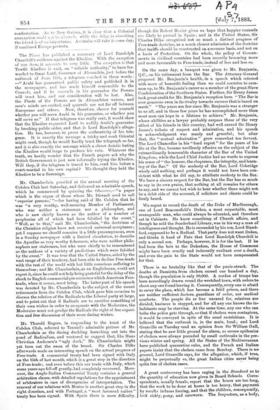Mr. Chamberlain presided at the annual meeting of the Cobden
Club last Saturday, and delivered an admirable speech, which he commenced by quizzing the Observer,—"a paper which is the organ of those whom Mr. Disraeli used to call 'superior persons,' "—for having said of Mr. Cobden that he was "a very worthy, well-meaning Member of Parliament, who was neither a statesman nor a philosopher, and who is now chiefly known as the author of a number of prophecies all of which had been falsified by the event." "Well, as to that," said Mr. Chamberlain, "the doctrines of the Christian religion have not received universal acceptance ; yet I suppose we should conceive it a little presumptuous, even in a Sunday newspaper with a limited circulation, to describe the Apostles as very worthy fishermen, who were neither philo- sophers nor statesmen, but who were chiefly to be remembered as the authors of a variety of predictions which were falsified by the event." It was true that the United States, aided by the vast range of their territory, had been able to decline Free-trade with the rest of the world with but little conscious suffering to themselves ; and Mr. Chamberlain, as an Englishman, could not regret it, since he could not help being grateful for the delay of the shock to English commercial pre-eminence which American Free- trade, when it comes, must bring. The latter part of his speech was devoted by Mr. Chamberlain to the subject of the recent retirements from the Cobden Club, which gave him occasion to discuss the relation of the Radicals to the Liberal party at large, and to point out that if Radicals are to sacrifice something of their own wishes in order to co-operate with the Moderates, the Moderates must not grudge the Radicals the right of free exposi- tion and free discussion of their more daring wishes.


































 Previous page
Previous page